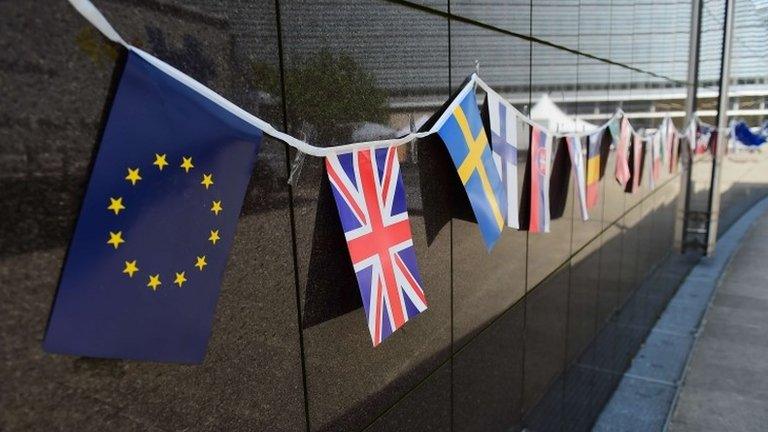EU talks: David Cameron seeking changes to in-work benefits 'brake'
- Published
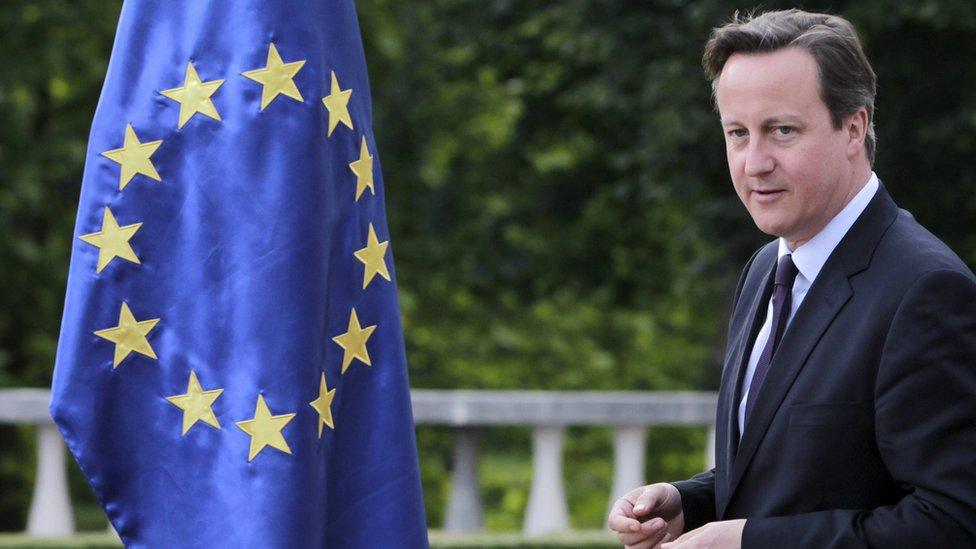
David Cameron will suggest changes to a proposed "emergency brake" on in-work benefits for EU migrants when he meets the European Council president later.
EU officials have suggested Britain could use the brake for up to four years, but would have to prove public services were under excessive strain.
It could be imposed within three months of the UK applying, if EU states agree.
But Mr Cameron will tell Donald Tusk he wants the brake in force straight after the EU referendum, with no time limit.
The pair are meeting at Downing Street to finalise a package of measures to put to EU leaders ahead of a summit between 18 and 19 February.
'Big beasts'
Eurosceptic Tory MP Steve Baker, Chairman of Conservatives for Britain, said an emergency brake on welfare payments to EU migrants is "a red herring".
Ex-defence secretary said the position ministers take will reflect on their judgement.
Speaking to Andrew Neil on the BBC's Sunday Politics, he said: "We think it's undeliverable... I think that they've ended up trying to manufacture the appearance of success out of very little."
Mr Baker said he expects between "50 and 70" Conservative MPs to campaign for a vote to leave the EU and that he's "prepared at this point to go into the campaign without any cabinet big beasts".
Some Leave campaigners are hoping big names such as Theresa May, Boris Johnson or Michael Gove will join their campaign when the date is announced.
Mr Cameron has said cabinet ministers will be free to campaign to leave the EU, but he is expected to ask them to back whatever he wins from re-negotiations.
Former defence secretary Liam Fox urged cabinet members considering joining the Leave campaign to ignore the "false concept of party loyalty".
He told BBC Radio 4's The World This Weekend MPs should "make the decision that is right for their country not what is right for them".
'Stop gap'
As part of his attempts to renegotiate the UK's membership of the EU, Mr Cameron had proposed denying in-work benefits to all EU migrants until they had been in the UK for four years.
He said stopping those migrants from claiming tax credits - income supplements paid to those in low-paid work - would reduce high levels of immigration to the UK.
Some Central European nations are against the plan however, saying it is discriminatory towards their citizens.
Christian Fraser explains UK Prime Minister David Cameron's proposal to delay paying in-work benefits to newly arrived migrants
EU leaders rejected Mr Cameron's plan and proposed the "emergency brake" as an alternative, to break the deadlock in the EU renegotiations.
The proposed brake, full details of which have not been confirmed, would allow any EU state to deny in-work benefits to new arrivals for up to four years - but only after proving services were under strain and securing the approval of a majority of other EU states.
Mr Cameron said the current proposal was "not good enough".
He is expected to tell Mr Tusk the brake must come into force immediately after the UK's referendum on EU membership, and must remain in place long enough to stem EU migration to the UK.
Mr Cameron will also say the brake should be seen only as a "stop gap" while a more permanent solution is found.
The PM will tell Mr Tusk he is prepared to delay the referendum, which has been promised by the end of 2017, until he is satisfied with the deal on offer.

David Cameron's four main aims for renegotiation
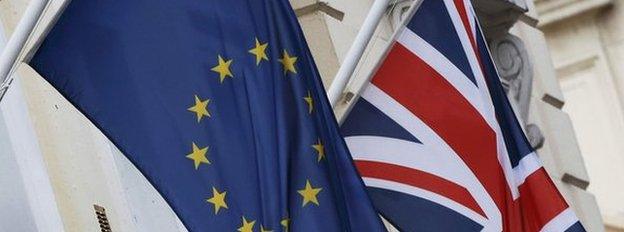
Integration: Allowing Britain to opt out from the EU's founding ambition to forge an "ever closer union" so it will not be drawn into further political integration
Benefits: Restricting access to in-work and out-of-work benefits to EU migrants. Specifically, ministers want to stop those coming to the UK from claiming certain benefits and housing until they have been resident for four years
Sovereignty: Giving greater powers to national parliaments to block EU legislation. The UK supports a "red card" system allowing member states to scrap, as well as veto, unwanted directives
Eurozone v the rest: Securing an explicit recognition that the euro is not the only currency of the European Union, to ensure countries outside the eurozone are not disadvantaged. The UK also wants safeguards that it will not have to contribute to eurozone bailouts
Referendum timeline: What will happen when?
Guide: All you need to know about the referendum

- Published29 January 2016
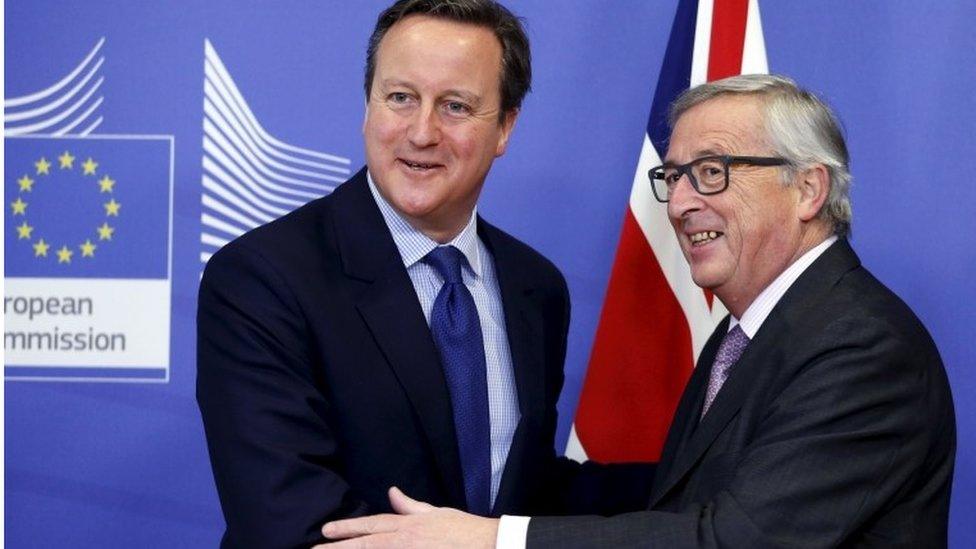
- Published22 January 2016
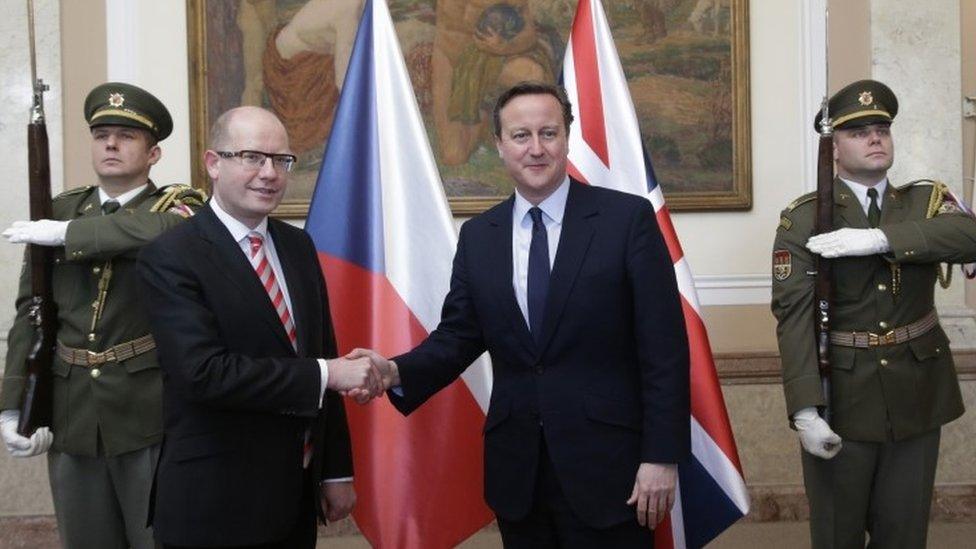
- Published17 February 2016
